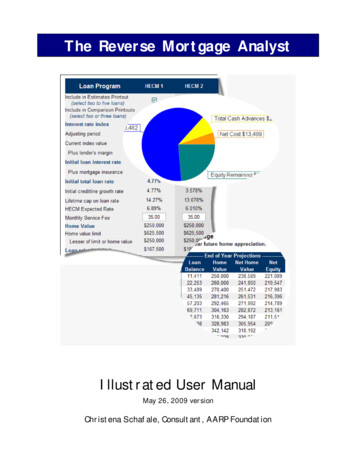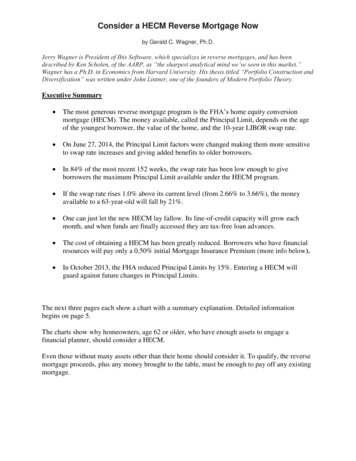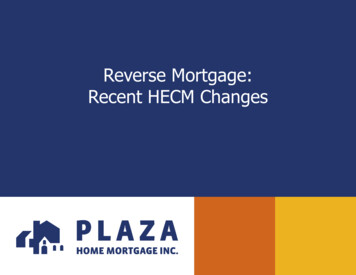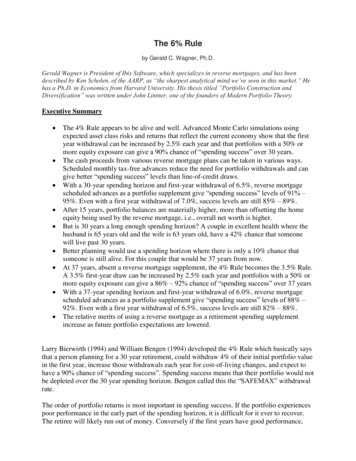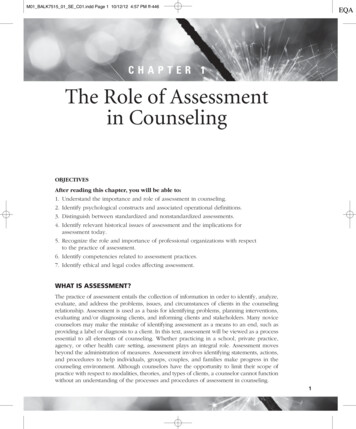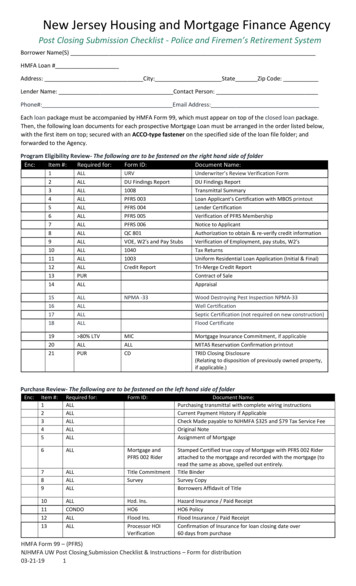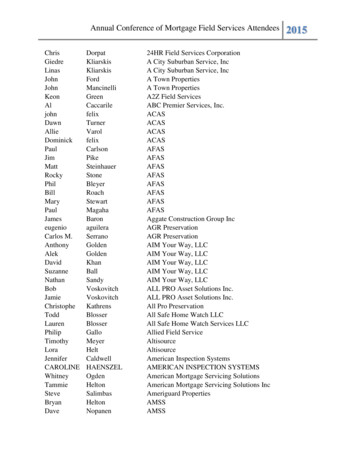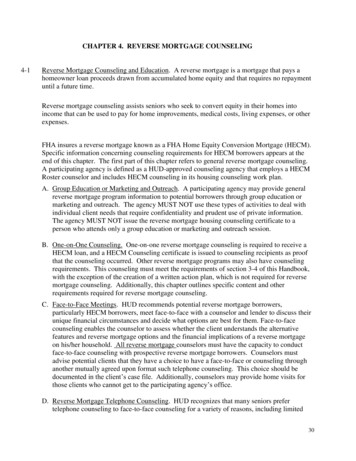
Transcription
CHAPTER 4. REVERSE MORTGAGE COUNSELING4-1Reverse Mortgage Counseling and Education. A reverse mortgage is a mortgage that pays ahomeowner loan proceeds drawn from accumulated home equity and that requires no repaymentuntil a future time.Reverse mortgage counseling assists seniors who seek to convert equity in their homes intoincome that can be used to pay for home improvements, medical costs, living expenses, or otherexpenses.FHA insures a reverse mortgage known as a FHA Home Equity Conversion Mortgage (HECM).Specific information concerning counseling requirements for HECM borrowers appears at theend of this chapter. The first part of this chapter refers to general reverse mortgage counseling.A participating agency is defined as a HUD-approved counseling agency that employs a HECMRoster counselor and includes HECM counseling in its housing counseling work plan.A. Group Education or Marketing and Outreach. A participating agency may provide generalreverse mortgage program information to potential borrowers through group education ormarketing and outreach. The agency MUST NOT use these types of activities to deal withindividual client needs that require confidentiality and prudent use of private information.The agency MUST NOT issue the reverse mortgage housing counseling certificate to aperson who attends only a group education or marketing and outreach session.B. One-on-One Counseling. One-on-one reverse mortgage counseling is required to receive aHECM loan, and a HECM Counseling certificate is issued to counseling recipients as proofthat the counseling occurred. Other reverse mortgage programs may also have counselingrequirements. This counseling must meet the requirements of section 3-4 of this Handbook,with the exception of the creation of a written action plan, which is not required for reversemortgage counseling. Additionally, this chapter outlines specific content and otherrequirements required for reverse mortgage counseling.C. Face-to-Face Meetings. HUD recommends potential reverse mortgage borrowers,particularly HECM borrowers, meet face-to-face with a counselor and lender to discuss theirunique financial circumstances and decide what options are best for them. Face-to-facecounseling enables the counselor to assess whether the client understands the alternativefeatures and reverse mortgage options and the financial implications of a reverse mortgageon his/her household. All reverse mortgage counselors must have the capacity to conductface-to-face counseling with prospective reverse mortgage borrowers. Counselors mustadvise potential clients that they have a choice to have a face-to-face or counseling throughanother mutually agreed upon format such telephone counseling. This choice should bedocumented in the client‟s case file. Additionally, counselors may provide home visits forthose clients who cannot get to the participating agency‟s office.D. Reverse Mortgage Telephone Counseling. HUD recognizes that many seniors prefertelephone counseling to face-to-face counseling for a variety of reasons, including limited30
mobility and health conditions. HUD allows participating agencies to provide telephonereverse mortgage counseling only if the agency has indicated that it will provide this as aservice option within its HUD approved housing counseling work plan. Participatingagencies must also define within its work plan the geographic area in which it will dotelephonic counseling. Participating agencies may provide nationwide telephonic counselingas long as it is defined in the housing counseling work plan.E. Counseling Requirement for Home Equity Conversion Mortgage HECM) Borrowers.Section 255(d) of the National Housing Act and the implementing FHA regulations at 24CFR § 206.41 state that all prospective HECM borrowers must receive reverse mortgagecounseling prior to obtaining a HECM. This counseling must be received from eligiblecounselors working for participating agencies approved to provide this statutorily requiredcounseling.To meet the statutory requirements for obtaining a HECM, the prospective borrower mustreceive one-on-one reverse mortgage counseling and be issued a HECM counselingcertificate. Counselors are allowed to provide the required reverse mortgage counseling to agroup of related family members if they are documented on the deed together.F. HECM Counseling Fees. Participating agencies may charge fees for reverse mortgagecounseling services to clients and related parties that are able to afford them. The fee mustnever exceed the actual cost of providing the service. Moreover, HUD may further limitallowable charges, for example through a Mortgagee Letter.The reverse mortgage counseling charges may be paid in any of two ways:(1)The HECM counseling client and related parties can pay counseling fees directly tothe agency;(2)The cost of HECM counseling can be paid out of a HECM borrower‟s loan proceeds.Upon agreement of both the lender and the borrower, the closing agent may assumeresponsibility for remitting payment to the counseling agency that performed theservice.Payment methods must be reflected in the 800 series on the HUD-1 settlement statement.Lenders (originators, servicers and funders) or other parties that sell annuities, investments,long-term care insurance or any other type of financial or insurance products are barred fromproviding compensation to counseling agencies.In accordance with Section 313 of 24 CFR Part 214, participating agencies are permitted tocharge fees for reverse mortgage counseling services as long as the cost does not create afinancial hardship for the client. The housing counseling agency must make a determinationabout a client‟s ability to pay based on factors, including, but not limited to, income and debtobligations.31
Clients must not be turned away because of an inability to pay counseling fees. Moreover,the housing counseling agency may not withhold counseling or the Certificate of HECMCounseling based on failure to pay.Moreover, HUD expects counseling agencies to avoid unnecessary separate counseling, andto make every practical effort to counsel the borrower(s) and any related partiessimultaneously.Participating agencies must not offer discount on counseling fees based on the client‟s abilityto pay service upfront. Clients that need to pay for counseling services out of the proceedsmust not be penalized for having to do so.4-2Entities Eligible to Provide Reverse Mortgage Counseling. Entities or individuals providingreverse mortgage counseling must be separate from reverse mortgage lending institutions. Onlyentities with active HECM Roster counselors are eligible to provide reverse mortgagecounseling. Agencies should see 24 CFR Part 206 for requirements for HUD‟s HECM Rosterplacement.To be placed on the HECM Counselor Roster, a counselor must meet the following criteria:1. Be employed by a HUD approved Housing Counseling Agency or an affiliate of a HUDapproved intermediary or State Housing Finance Agency;2. Successfully passed the standardized HECM exam administered by HUD or a party selectedby HUD;3. Received training and education related to HECM within the prior two years;4. Have access to technology that enables HUD to track the results of the counseling offered toeach HECM client; and5. Is not documented on any of the following:a. The General Service Administration‟s Suspension or Debarment List;b. HUD‟s Limited Denial of Participation List; orc. HUD‟s Credit Alert Interactive Response SystemIn order to remain active on the Roster, a counselor must provide proof of training or continuingeducation every two years and pass the HECM exam every three years. These timeframes areeffective from the date the counselor gets on the Roster, i.e. the counselor must receive trainingor continuing education within two years of the date the counselor gets on the Roster.An agency must also identify reverse mortgage counseling in its approved housing counselingwork plan including the specific geographic areas the agency will provide reverse mortgagecounseling. An agency may provide telephone counseling nationwide provided this is includedin the housing counseling work plan. The agency must also agree in its housing counseling workplan to HUD‟s quality control measures which may include mystery shopping, performancereviews or other actions as determined by HUD.32
4-3HECM Counseling Protocol. As a condition of eligibility to provide reverse mortgagecounseling, HECM Roster Counselors are also required to use the HUD‟s standardized HECMProtocol as guidance when providing HECM counseling. The HECM Protocol providesguidance to counselors on all the information that they must cover during a counseling session.The HECM protocol is Appendix 4 of this handbook.4-4Preparation for the HECM Counseling Session. HUD requires agencies to provide clients withan information packet prior to the counseling session and in enough time so the client has time toreview the information and prepare questions. In cases where emergency counseling isnecessary, the counselor must send the information to the client immediately after completing thecounseling session. Additional guidance on this requirement is provided in the HECM protocol.Written communications should include instructions on how to contact the agency via TTY,relay or other assistive means for persons with hearing impairments. Written communicationscan also inform clients and prospective clients about translation or interpreter services. Inaddition, written communications should ask clients and prospective clients whether they needassistance for mobility impairments, visual or hearing impairments, or other disabilities.The information packet can be sent via regular mail, priority mail, fax or email and must include:1. “Preparing for Your Counseling Session”- See HECM Protocol Attachment C.122. Printout of loan comparisons3. Printout of Total Annual Loan Cost (TALC) – This calculation is available on the IBISsoftware that counselors use to prepare loan printouts and TALC printouts.4. Loan amortization schedule5. The National Council on Aging (NCOA) booklet “Use Your Home to Stay at Home – AGuide for Homeowners Who Need Help Now”Note: Loan printouts must be relevant to the client‟s situation to facilitate the counseling session.4-5Topics to be Covered in the HECM Counseling Session. In accordance with HECM statute andregulations National Housing Act Section 255 (f), Counselors must provide potential HECMborrowers with all the information outlined below. It is suggested that counselors confirm theclient‟s receipt and review of the information. While clients may also receive some of theinformation outlined below from lenders, it is the role of counselor to explain the concepts ofreverse mortgage and answer any questions the client may have. However, it is not thecounselor‟s role to provide legal advice on any issues during the course of providing counseling.A.B.Alternatives and Options. Counselor reviews information on client's other options asavailable and appropriate.Reverse Mortgage Information. The counselor reviews basic information on reversemortgages. The counselor may present this information within the context of the HECMprogram. The topics most essential to an understanding of reverse mortgages include:1.Rising debt, falling equity2.Repayment- requirements, when, how much3.Nonrecourse limits4.Leftover equity (implications for borrower and their heirs)33
5.6.7.8.9.10.C.Factors that determine loan amounts and loan limitsBorrower obligations - especially taxes & insurance (See “Reverse MortgageBorrower Obligations” in Appendix 4, provide client with this handout)Fees and fee financingRetention of title and other title issuesImpact on public benefits (may use National Council on Aging‟swww.benefitscheckup.org as reference)Refinancing a reverse mortgageHECM- Specific Information. The counselor should discuss key HECM programfeatures and information, including:1.Eligibility, including any special problems relating to deed or property (ImportantNote: While the counselor can generally describe basic borrower and propertyeligibility requirements for a HECM, remember that only the lender and an FHAapproved appraiser are authorized to make official determinations regarding theeligibility of both the homeowner and subject property.)2.Principal limit (the amount the borrower can receive from a HECM) - Theprincipal limit at origination is based on the age of the youngest borrower, theexpected average mortgage interest rate and the maximum claim amount.3.Expected Rate- The expected rate is fixed throughout the life of the loan and isused to determine payments to the borrower. For a fixed rate loan, the expectedrate is the fixed interest rate. For an adjustable rate loan, the expected rate is thesum of the lender's margin and the loan‟s index adjusted to a constant maturity often years.4.Claim Amount- The maximum claim amount is the lesser of the appraised valueof the property or the maximum mortgage amount for a one-family residence thatHUD will insure in an area under Section 203(b)(2) of the National Housing Act.The maximum claim amount represents the maximum amount that HUD will payon a claim for insurance benefits.5.Payment plan options and changes -A HECM borrower may request to change thepayment plan at any time during the life of the loan. The lender may charge a fee,not to exceed 20.00, for changing the payment plan. A borrower may change theterm of payments, may receive an unscheduled payment, may suspend payments,may establish or terminate a line of credit, or may receive the entire net principallimit (i.e., the difference between the current principal limit and the outstandingbalance) in a lump sum payment. With all payment plans, the lender must be ableto make lump sum payments up to the net principal limit at the borrower's request.The borrower may choose to prepay all or part of the outstanding balance at anytime without incurring any penalties.34
6.Credit line growth - The unused portion of the line of credit grows at the “creditline growth rate,” which is equal to the note rate. This is the same rate at whichthe principal limit and the loan balance grow, which is the current interest rateplus 0.5 percent. Therefore, the amount of funds available to the borrower from aline of credit grows larger each month for as long as any funds remain.Counselors must not tell clients that HECM credit lines “earn interest”, becausecredit line growth is simply increased access to borrowing power, comparable toan increase in a credit limit on a credit card.7.FHA home standards, required repairs8.Loan costs (reference Appendix “Reverse Mortgage Product Features and Impactof Change”)a. Application fee, appraisal fee, credit reportb. Closing costsc. Origination feed. Servicing feee. Mortgage insurance premiumf. Interest rate: Adjustable and Fixed and adjustment frequency9. Repaymenta.b.c.d.RequirementsWhenHow muchOpen-end credit v. Closed-end creditOpen-end credit loans allow for the repayment of some or the entireprincipal that can be re-borrowed at some future point in time ("revolvingcredit"). Closed-end credit loans do NOT allow for the "re-borrowing" ofprincipal that is paid on the loan (the “tenure” option for HECM loans).10. Borrower obligations - (See Appendix C “Reverse Mortgage Borrower Obligations,”provide client with this handout)11. Tax implications12. Estate planning services – Counselors should refrain from giving legal, tax, andaccounting advice to a prospective or existing client during a housing counselingsession and/or meeting. If counselors are licensed professionals and are askedgeneral questions related to that discipline, counselors may respond but should referclients to an outside source for advisory service. Counselors should not misrepresentthemselves to hold financial designations, for example, the designations of CertifiedFinancial Planner (CFP) or Certified Public Accountant (CPA), unless they hold thesetitles. When a client‟s needs are beyond the housing counselor‟s education, trainingor certification to provide, they should refer the client to a financial advisor or otherprofessional.35
13. Loan application: FNMA 1009 “Residential Loan Application for ReverseMortgages” – This application is provided by the lender; however, counselors shouldreview with client if requested.D. Financial Implications. The counselor reviews financial implications of reverse mortgages tohelp clients assess whether the reverse mortgage proceeds will be sufficient to meet theirfinancial obligations including taxes and insurance. Counselor may reference printouts,including proprietary loan comparisons, as appropriate. (See Part 2: Additional Products)Financial overviews and printouts may include:1.2.3.Cash advances and itemized costsIndividual loan amortization schedule(s)Future projections and comparisonsa.b.c.d.4.Total cash advancesTotal dollar costsLeftover equityTotal annual average ratesLoan and annuity combinations. Counselors must ask a client if they intend touse the HECM proceeds to buy an annuity. If so, the Counselor should inform thehomeowner that there are other ways to purchase an annuity and to point out thatin most cases term or tenure HECM proceed amounts are greater than the annuitymonthly payment. The federal Truth-in-Lending Act (TILA) recognizes theunique difficulty of evaluating the total cost of a HECM that is used to purchasean annuity. Counselors are also advised to give clients the brochure entitled“Using a Reverse Mortgage to Buy an Annuity.” More detailed informationabout HECM loans and annuity combinations is contained the HECM ProgramProtocol, Appendix 4.E. Client Concerns and Questions. Counselor answers client questions & discusses options.F. Next Steps. Counselor explains follow-up packet and next steps.1.23.4.4-6Contents of follow-up packet (See Section 4-4 of this handbook)Instructs client to make and keep copies of all documentsLoan processing & expected timelinesProvides ongoing access to counselor and other resourcesReverse Mortgage Printouts. A counselor must utilize and provide to the counseling recipientcomputer printouts generated by HUD or HUD endorsed software, or similar software generatingthe same information, for calculating the maximum funds available to borrower(s), payment planoptions, and providing loan comparisons of available products to clients. Using the software,counselors will be able to show clients how variations in different reverse mortgage productsmay affect clients‟ access to equity, amortization schedules, loan balances, and/or loan costs.36
Counselors may discuss loan printouts and amortization schedules given by lenders to clients.They may also generate and discuss amortization schedules and loan comparisons they generatefrom an available reverse mortgage calculator. Counselors should answer questions about theloan printouts and product features. However, counselors must be sensitive when helping theirclients analyze and compare the financial implications of the loan choices clients are considering.Counselors must be cautious not to steer clients toward any particular proprietary or HECMproduct. They should strive to provide a balanced view by only providing individuallycustomized loan printouts to clients on1.2.3.HECM loans that are widely available from a majority of HECM lenders,Proprietary products that are broadly offered by reverse mortgage lenders, andProprietary or HECM products that have been offered to that client by a reversemortgage lender.The printouts should include:1.2.3.4.Future remaining credit line projections based on credit line drawsspecified by the client (if the client selects a credit line).A comparison of estimated loan details at closing.Projected loan comparisons at various future times, including projectedfigures for total cash received, cash remaining, and total cost expressed interms of total dollars and a total annua
REVERSE MORTGAGE COUNSELING 4-1 Reverse Mortgage Counseling and Education. A reverse mortgage is a mortgage that pays a . Printout of Total Annual Loan Cost (TALC) – This calculation is available on the IBIS software that counselors use to prepare loan print
